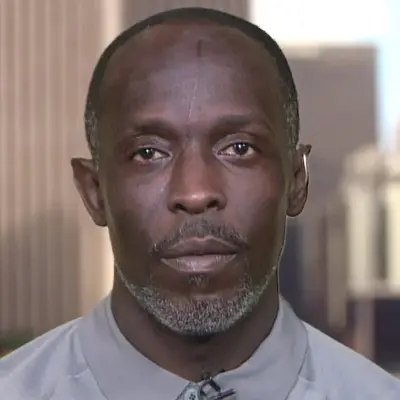Michael K. Williams was a performer openly daunted by the task at hand: a shock absorber
-

"No knock on David Simon and Ed Burns, but it was Williams who invented Omar. For the job, the rookie actor immersed himself in Baltimore," says Doreen St. Felix of the late The Wire star, who died Monday at age 54. "He improvised on the set, deepening the history that he was given; the kiss between Omar and his boyfriend, in Season 1, was unscripted and initiated by Williams. As Omar took shape over the seasons, he began to cut a Bogart figure: the outlaw administrator of a one-man moral code. The game was the game. Not for Omar. The audience loved him for his individuality, but, gay or straight, they also wanted him—to be punished or rescued by him, whatever he wanted. I remember Williams-as-Omar as an inaugural love object of the so-called prestige age of television. The contact that Williams made with the public through Omar is rare and destabilizing. When Omar was killed, in 2008, toward the end of The Wire, Williams lost his moorings and his sense of identity. On the block, fans would call him by his character’s name, which is to say that they were asking after a ghost. To be reminded that the actor was 'more than' Omar is to acknowledge in the same breath that Omar was a masterpiece. But Williams was, of course, more than that one role. Some fans hold his Boardwalk Empire character, the sneering bootlegger Chalky White, in equal regard. Others, myself included, are partial to his portrayal of Freddy, the suave and mercurial Rikers mentor to Riz Ahmed’s frightened Naz Khan, in The Night Of. Williams is lauded for scene-stealing, but he was a generous partner. Playing against Ahmed, Wendell Pierce, Steve Buscemi, Jeffrey Wright, Queen Latifah, and others, he was extraordinarily contained. Is it taboo to say that Williams, an actor who approached the text with a self-effacing modesty, could let the work take over if he wasn’t careful? And that he did not always desire to be careful? I am not suggesting that art caused his death. I am saying, with pained admiration, that Williams could not produce in the cold manner of contemporary professionalized actors. And, because he was not a spokesman guarding the Black Hollywood brand, Williams, a recovering addict, spoke honestly about how inhabiting Omar, and later, Montrose, triggered relapses. He was open about the afterlife of the job, how it took strangling root in him. Williams was drawn to works of heightened realism, but no one would describe his performances, even the rougher ones, as merely realistic."
ALSO:
- Michael K. Williams was a beacon for lost souls: Williams "was not a classically-trained actor," says Julian Kimble. "His gifts—a remarkable knack for finding the humanity in characters pushed to society’s margins; the ability to dominate a scene on the strength of his mere presence—were instinctive. He didn’t get his first role (playing High Top, the younger brother of Tupac’s Tank, in Bullet) until 1996, when he was nearly 30 years old. He spent years adrift in his native East Flatbush dabbling in petty crime, struggled with a drug addiction he was frank about, and was haunted by an upbringing marked by abuse and depression against the backdrop of institutional failure. Although Williams literally wore the wounds of his past on his face, he wasn’t defined by his trauma. There was a distinct warmth that radiated from him. Still, Williams strived to find beauty in the darkness of his own experiences and the characters he brought to life. Despite feeling lost at various points and engaging in battle with his own complexities for the duration of his existence, Michael K. Williams found himself on-screen.
- In the Vanderveer Projects in East Flatbush, Brooklyn, Michael K. Williams was another kind of star
- Williams was an icon for Black queer men, but he was also a beacon for what’s possible to ask of straight Black men
TOPICS: Michael K. Williams, The Wire, LGBTQ
More Michael K. Williams on Primetimer:- What happened to Michael K. Williams? Sister pays tribute four years after actor’s death
- Four arrested in connection with Michael K. Williams' overdose death
- Can Vice TV's Black Market return for a Season 3 without Michael K. Williams?
- Tracy Morgan, Rosie Perez and Felicia Pearson to narrate the final three episodes of Michael K. Williams' Black Market
